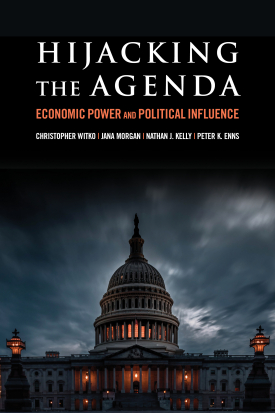
Hijacking the Agenda
About This Book
Winner of the 2022 Gladys M. Kammerer Award from the American Political Science Association
“Hijacking the Agenda should have a big impact on how we think about Congress, policymaking, and political inequality. It provides an ambitious and creative analysis of an often-overlooked dimension of political power—the outsized role of the wealthy and well-organized in determining whose problems get addressed and whose get ignored.”
—Larry M. Bartels, May Werthan Shayne Chair of Public Policy and Social Science, Vanderbilt University
“To know who governs, we must know who controls the governing agenda. In this innovative book, four top political scientists show that the congressional agenda is disproportionately shaped by economic elites and the politicians most friendly to and funded by them. Combining sophisticated quantitative analysis and compelling case studies, Hijacking the Agenda sets a new standard for research on inequality and American democracy—and sounds a loud warning that all scholars and citizens should hear.”
—Jacob Hacker, Stanley Resor Professor of Political Science, Yale University
Why are the economic concerns of lower- and middle-class Americans so often ignored by Congress, while the economic goals of the wealthiest are prioritized, often resulting in policies promoting their interests? In Hijacking the Agenda, political scientists Christopher Witko, Jana Morgan, Nathan J. Kelly, and Peter K. Enns examine why Congress privileges the concerns of businesses and the wealthy over those of average Americans. They go beyond demonstrating this bias to document how and why economic policy is skewed in favor of the rich.
The authors analyze over 20 years of floor speeches by thousands of members of Congress to examine how campaign contributions and independent expenditures on behalf of candidates help set the national economic agenda. They find that legislators receiving more support from business and other wealthy interests were more likely to discuss the deficit and other upper-class priorities, while those receiving more assistance from unions were more likely to discuss issues important to the lower and middle class, such as economic inequality and wages. This attention imbalance matters because when members of Congress talk about certain issues, their speech is often followed by legislative action. While unions use their resources to push back against wealthy interests, spending by the wealthy dwarfs that of unions, often giving the upper class the upper hand.
The authors use case studies analyzing financial regulation and the minimum wage to demonstrate how the economic power of the wealthy enables them to advance their agenda. In each case, the authors examine structural power, or the power that comes from a group’s economic position, and kinetic power, the power that comes from the ability to mobilize organizational and financial resources in the policy process. They show how business uses its structural power and resources to effect policy change in Congress, as when the financial industry in the late 1990s promoted passage of a bill that eviscerated financial regulations put in place after the Great Depression. Likewise, when business wants to preserve the status quo, it uses its power to keep issues off of the legislative agenda, as when inflation erodes the value of the minimum wage and its declining purchasing power leaves minimum-wage workers in poverty. Although groups representing lower- and middle-class interests, particularly unions, are sometimes able to shape policy if conditions are right, they lack structural power and have limited financial resources. As a result, the wealthy have considerable advantages in the policy process, advantages that only intensify as their economic power becomes more concentrated and policymakers continue to see policies beneficial to business as beneficial for all.
Hijacking the Agenda is an illuminating account of the way economic power influences the congressional agenda and policy process to privilege the wealthy and marks a major step forward in understanding the politics of inequality.
CHRISTOPHER WITKO is professor of public policy and political science and associate director of the School of Public Policy at Pennsylvania State University.
JANA MORGAN is professor of political science at the University of Tennessee.
NATHAN J. KELLY is professor of political science at the University of Tennessee.
PETER K. ENNS is professor of government at Cornell University and executive director of the Roper Center for Public Opinion Research.
